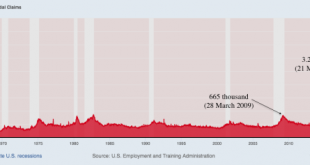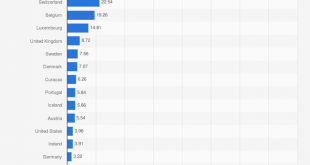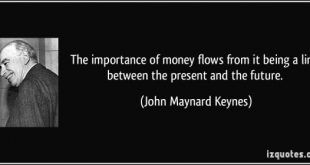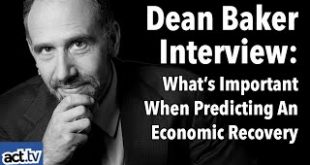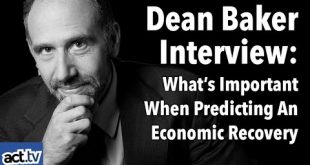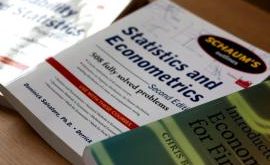from an article by Nassim Nicholas Taleb and Yaneer Bar-Yam in yesterday’s Guardian Dominic Cummings [Chief Adviser to UK Prime Minister Boris Johnson] loves to theorise about complexity, but he’s getting it all wrong. . . . The error in the UK is on two levels. Modelling and policymaking. First, at the modelling level, the government relied at all stages on epidemiological models that were designed to show us roughly what happens when a preselected set of actions are made, and not what...
Read More »Claims in USA for jobless benefits last week rose to 3.28 million from 282,000 a week earlier.
from David Ruccio The Labor Department on Thursday reported the number of American workers filing new claims for jobless benefits last week rose to 3.28 million from 282,000 a week earlier. Nothing in the 53-year history of the series comes close. In the worst week of 2009, when the job market was reeling, initial claims hit 665,000. Worse, the millions in new claims don’t reflect all the people who were pushed out of jobs last week as the novel coronavirus crisis emptied out Main...
Read More »Coronavirus deaths per million by country
Source: https://www.statista.com/statistics/1104709/coronavirus-deaths-worldwide-per-million-inhabitants/
Read More »On the non-neutrality of money
from Lars Syll Paul Krugman has repeatedly over the years argued that we should continue to use neoclassical hobby horses like IS-LM and Aggregate Supply-Aggregate Demand models. Here’s one example: So why do AS-AD? … We do want, somewhere along the way, to get across the notion of the self-correcting economy, the notion that in the long run, we may all be dead, but that we also have a tendency to return to full employment via price flexibility. Or to put it differently, you do want...
Read More »Tackle climate crisis and poverty with zeal of Covid-19 fight, scientists urge
from today’s Guardian The Covid-19 crisis has revealed what governments are capable of doing and shone a new light on the motivation for past policies and their outcomes, said Sir Michael Marmot, professor of epidemiology and public health at University College London, and chair of the commission of the social determinants of health at the World Health Organisation. “The overriding objective [of governments for the last decade] has been austerity, and life expectancy for the worst-off has...
Read More »Corona is like the flu. The Spanish one.
Yesterday, the number of Corona deaths in Italy rose to 919. In one day. According to Eurostat, the 2018 total Italian death tally was 633,000. Which translates to on average 1,734 deaths a day meaning that the level of Corona deaths was over half of the ‘normal’ amount of deaths. Already. Despite the lock down. Dear people: this is much worse than a bad flu. And it is as bad as the Spanish flu. Which is supposed to have killed, around 1919, about 50,000,000 people. FYI: the latest...
Read More »Dean Baker Interview: What’s Important When Predicting An Economic Recovery
Follow on Twitch: https://www.twitch.tv/actdottv Julianna sits down with Dean Baker, macroeconomist and co-founder of the Center for Economic and Policy Research, to discuss what’s important when predicting an economic recovery, how the economy versus public health is a false dichotomy that lots of wall streeters would like us to believe is real, and how the health of the economy is dependent on the health of the people who drive it. Dean Baker co-founded The Center for Economic and...
Read More »Dean Baker Interview: What’s Important When Predicting An Economic Recovery
Follow on Twitch: https://www.twitch.tv/actdottv Julianna sits down with Dean Baker, macroeconomist and co-founder of the Center for Economic and Policy Research, to discuss what’s important when predicting an economic recovery, how the economy versus public health is a false dichotomy that lots of wall streeters would like us to believe is real, and how the health of the economy is dependent on the health of the people who drive it. Dean Baker co-founded The Center for Economic and Policy...
Read More »Back to work? A modest proposal
from David Ruccio By now, many readers will have seen or heard Donald Trump’s call for the country to get back to work within the next couple of weeks, accompanied by a slew of other insidious and irresponsible remarks along the same lines—from business executives, politicians, and pundits, including ex-Goldman Sachs CEO Lloyd Blankfein, Texas Lt. Gov. Dan Patrick, and Fox News. What can one say in response to such a blatant disregard for workers’ lives, all in an attempt to protect...
Read More »Econometric modelling as junk science
from Lars Syll Do you believe that 10 to 20% of the decline in crime in the 1990s was caused by an increase in abortions in the 1970s? Or that the murder rate would have increased by 250% since 1974 if the United States had not built so many new prisons? Did you believe predictions that the welfare reform of the 1990s would force 1,100,000 children into poverty? If you were misled by any of these studies, you may have fallen for a pernicious form of junk science: the use of mathematical...
Read More » Real-World Economics Review
Real-World Economics Review

